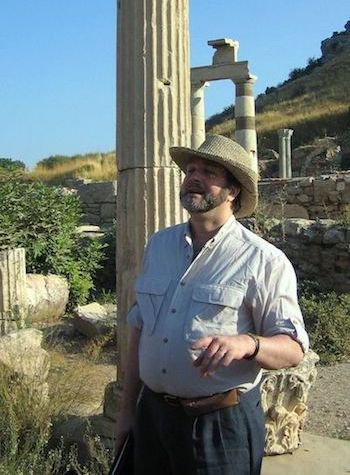Sabbatical Sojourns: History with David Wick
This is the first in a series of seven articles featuring the research conducted by faculty members on sabbatical during the fall 2018 semester. A shorter version of this article originally appeared in the spring 2019 issue of STILLPOINT. Read more articles from this issue here: stories.gordon.edu/tag/stillpoint2019

Viral content began long before social media, according to David Wick (history), an expert in connecting the present with the past.
In Greece for most of his sabbatical, Wick followed rabbit trails of evidence from fellow scholars in pursuit of a “rather odd set of phenomena,” including the parallels between the campaigns of Julius Caesar and the 2016 presidential election.
Wick has observed that ancient Athenian social media (though without modern technology) played a similar role in politics as it does today. In the case of Julius Caesar, a frenzy of campaigning led to such polarized stances that, when he marched into Rome, the public froze. Wick draws a parallel to the polarized public opinions on 2016 presidential candidates Hillary Clinton and Donald Trump: “We had this whole election season where people didn’t know what to do because there was no middle ground,” he says.
Fast-forwarding several years from Ancient Athens, Wick also wrote on the unusual event of an attempt at religious revival in pre-Christian Rome only 15 years before Christ. “You never expect to find that outside of Christianity, and it’s curiously close to Christ’s birth,” Wick says, “like the desire for moral revival was in the air.”
As Wick’s sabbatical drew to a close in December, he helped run the 2018 Conference on the Arts and Humanities, put on by the Athens Institute for Education as Research. In his segment on historical interpretation and museum interpretation, he discussed the ways in which these practices highlight the importance of the liberal arts.
 The Bell
The Bell